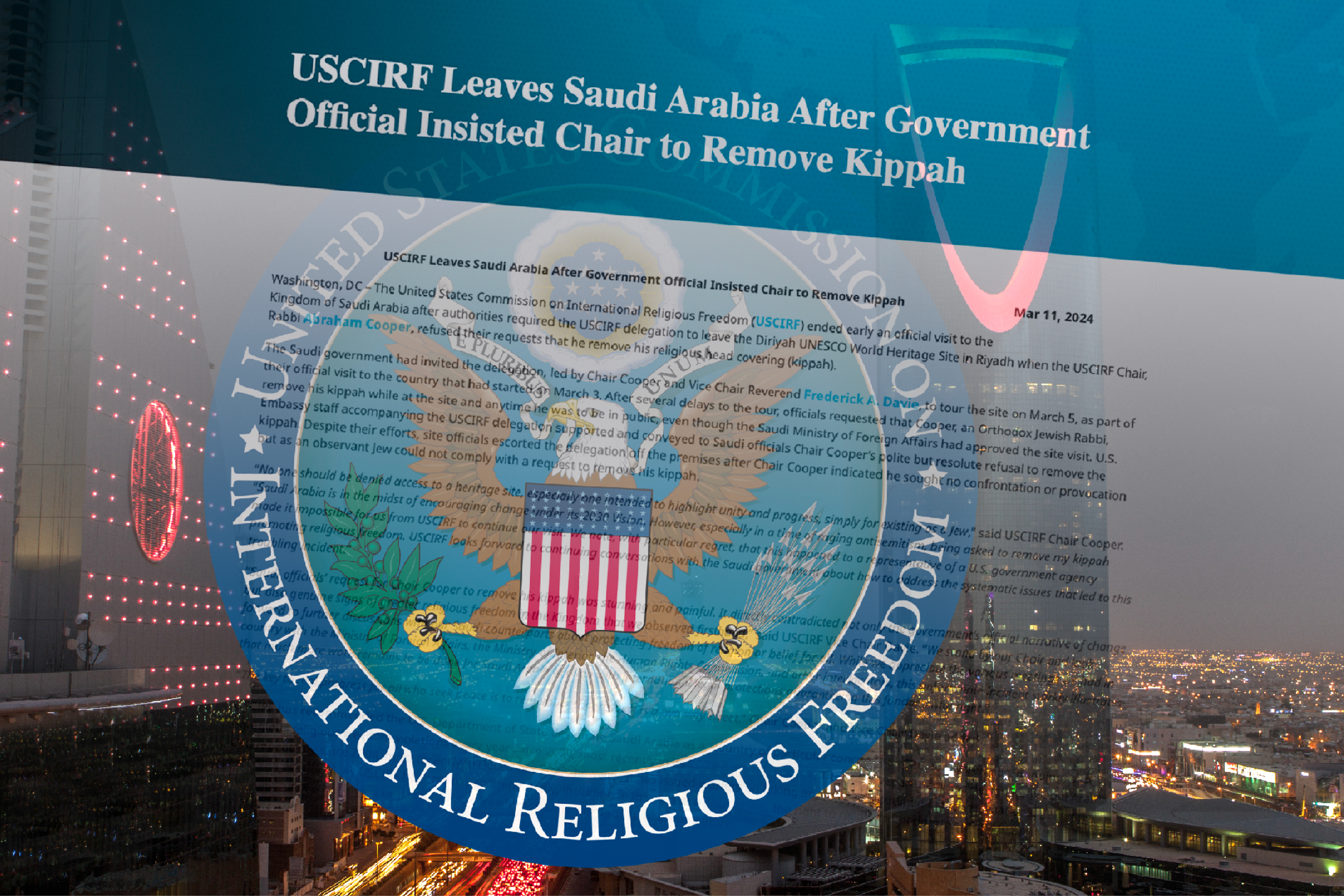
-
HOME
-
WHAT IS STANDOur Mission Our Values Our Help Contact
-
WHAT WE FIGHT FORReligious Freedom Religious Literacy Equality & Human Rights Inclusion & Respect Free Speech Responsible Journalism Corporate Accountability
-
RESOURCESExpert Studies Landmark Decisions White Papers FAQs David Miscavige Religious Freedom Resource Center Freedom of Religion & Human Rights Topic Index Priest-Penitent Privilege Islamophobia
-
HATE MONITORBiased Media Propagandists Hatemongers False Experts Hate Monitor Blog
-
NEWSROOMNews Media Watch Videos Blog
-
TAKE ACTIONCombat Hate & Discrimination Champion Freedom of Religion Demand Accountability
USCIRF Leaves Saudi Arabia After USCIRF Chair Asked to Remove Religious Head Covering
The U.S. Commission on International Religious Freedom (USCIRF) abruptly ended its visit to Saudi Arabia earlier this month when the Commission’s chair, Rabbi Abraham Cooper, an Orthodox Jew, declined authorities’ request to remove his kippah at the Diriyah UNESCO World Heritage Site in the Saudi Arabian capital of Riyadh.

Following Rabbi Cooper’s refusal, he and the USCIRF delegation were escorted off the site. Saudi officials had also required that, while in the kingdom and in public, Rabbi Cooper remove his kippah—a religious head covering—a mandate that the USCIRF chair quietly but firmly rejected.
Consequently, USCIRF ended its official visit to the kingdom early.
“No one should be denied access to a heritage site, especially one intended to highlight unity and progress, simply for existing as a Jew,” Cooper said. “Saudi Arabia is in the midst of encouraging change under its 2030 Vision. However, especially in a time of raging antisemitism, being asked to remove my kippah made it impossible for us from USCIRF to continue our visit. We note, with particular regret, that this happened to a representative of a U.S. government agency promoting religious freedom. USCIRF looks forward to continuing conversations with the Saudi government about how to address the systematic issues that led to this troubling incident.”
“The key to real progress for all who seek peace is to remember that respect is a two-way street.”
The U.S. State Department, on recommendations from USCIRF, has repeatedly designated the Kingdom of Saudi Arabia a Country of Particular Concern—most recently in December 2023—for egregious violations of religious freedom, including the jailing of religious freedom advocates and the execution of religious minorities.
“Saudi officials’ request for Chair Cooper to remove his kippah was stunning and painful. It directly contradicted not only the government’s official narrative of change but also genuine signs of greater religious freedom in the Kingdom that we observed firsthand,” said USCIRF Vice Chair Frederick A. Davie.
Shortly after the incident, the Embassy of Saudi Arabia in the United States issued an open letter that stopped short of an apology: “Regarding a recent incident in which a member of a delegation visiting the Kingdom of Saudi Arabia—Rabbi Abraham Cooper—was denied entry to Diriyah Gate, we would like to convey the following clarification: This unfortunate incident was the result of a misunderstanding of internal protocols. The matter was escalated to senior officials, and HRH [Her Royal Highness] the Ambassador had the opportunity to speak with the Rabbi. We look forward to welcoming him back to the Kingdom.”
As of this writing, there is no date for the delegation to revisit Saudi Arabia.
In a joint statement made when the delegation left the kingdom, USCIRF Chair Cooper and Vice Chair Davie said, “The key to real progress for all who seek peace is to remember that respect is a two-way street.”






